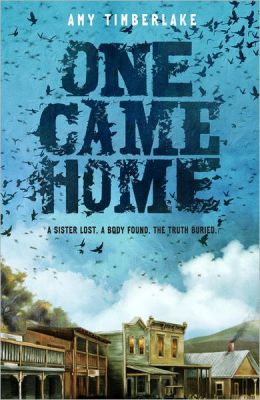It’s what every child has to do, and they accomplish it with varying degrees of success. In a sense, “growing up” is the theme of every children’s book, either obviously or not so much. The best of them show the main character or characters changing in some significant way, usually through conflict. What the character learns will then stand him or her in good stead on the way to adulthood. These two novels for middle-graders are blatant about that theme in their different ways–one historical and one allegorical.
One Came Home, by Amy Timberlake. Knopf, 2012, 245 pages. Age/interest level: 10-up.

“The heavens declare the glory of God; and the firmament sheweth his handiwork.” That’s the text preached at the funeral of Georgina (Georgie) Burkhardt’s sister Agatha. Agatha was in love with God’s handiwork, even in its most troublesome manifestations, such as the great passenger pigeon migration of 1871. This (actual historical) event terrified Georgie: “It was night at three o’clock in the afternoon. My world snapped to a box. The air staled. A kind of sleet fell from that winged ceiling . . . the sky was a feathered fabric, weaving itself in and out, unraveling before my eyes.” The birds established a huge (also historical) nesting area, six to ten miles wide and 125 miles long, near the girls’ home in Lake Placid, Wisconsin. When the pigeons finally left, Agatha left with them, in the company of three bird enthusiasts who were following the flock. Local constable Sheriff McCabe set out in pursuit, but a few days later he returned with a body in a ruined taffeta ball gown last seen on Agatha herself. The body is in no shape to be identified, which is why Georgie strongly suspects it’s not her sister.
Or perhaps Georgie is just looking for any means of assuaging her guilt. It was probably because of something she said—or rather, information divulged to the wrong person, that Agatha ran off in the first place. Whatever the reason, Georgie is determined to find out the truth, wherever it leads her. With a single-shot Springfield rifle and determination beyond her 13 years, she bargains with Agatha’s former beau, Billy McCabe, for a horse–and ends up taking Billy on as a partner. True Grit immediately comes to mind, and not without reason, for Georgie is as schooled in the scriptures as Mattie Ross, and as rock-solid in conviction: “People are supposed to die at home. They’re supposed to have time to tell last wishes. They’re supposed to be able to pray, to repent for their sins, and to commend their souls to God.” But she has doubts too, not only about God, but about herself: “From here on out, I’d have to keep my own company. Trouble was, I didn’t like myself much.”
Georgie’s voice is one of the great pleasures of this novel. Here she tries to get information at the last town where Agatha was seen:
I spoke with a good handful of people. One [woman with a rooster under her arm] put out a hand. “No nearer—I’m liable to snap you instead of this rooster’s neck. Tonight all his cock-a-doodling becomes chicken noodling.” Others took their time: for instance, the cowboy with as pronounced a parenthetical gait as I’ve ever seen.
It’s not as long or perilous a journey as Mattie’s quest for her father’s murderer, but there’s enough danger and cussedness for a good story. With an outstanding voice, characters, and setting, I hate to say I was a little disappointed in the ending, which brought Agatha down in my estimation, if not her sister’s. But Georgie’s growing-up experience has both stretched and softened her, and she walks out on a more expansive world.
- Worldview/moral value: 4.5
- Literary value: 5


“One day when he woke up, things were different.” Jack knows right away what the difference is: his bike is gone! Scramjet, the awesomest, flashiest, boldest ride in all of Hokey-Pokey, that he himself cut out of the maverick bicycle herd and made his own because only he could—Scramjet has been stolen. By a girl. He won’t even deign to say her name, but he knows who it was, and he’s going to get his revenge. It won’t be as easy as he thinks because, in some way he can’t define, things are different:
The world was once so simple. Gorilla Hill was Gorilla Hill. The Wall was the Wall. Stuff was Stuff . . . sure there were questions but they were a familiar part of the landscape, comforting if only because the answers were always out of reach.
For most of us, the classic age of childhood is roughly between 8 and 13: the bike-riding years, when (if the neighborhood is safe enough and your time isn’t booked up with dance lessons and Tae Kwon Do) you can grab your best buds and go, whether you circle the block umpteen times or discover a place in the woods that would be perfect for a hideout. Time holds still in those years, like life holding its breath until adolescence crashes in with dangly limbs and pimples. Spinelli, who grew up in the fifties, recalls this time well; so do I. I’m not sure how many of his intended audience will.
There’s very little plot: just one day in the own-little-world of Hokey-Pokey. Jack, with his sidekicks Dusty and LaJo, plot to get his bike back from his nemesis Jubilee, while she and her bff AnaMae counterplot against him. Meanwhile, Harold Peter Bitterman, Jr., self-dubbed The Destroyer, terrorizes the little kids, also known as Newbies, Snotsippers, Gappergums, and Sillynillies. Upon arrival in Hokey-Pokey, Newbies shed their diapers and receive a tattoo, signaling “I’m a kid!” From then on they spend their days in cheerful mayhem, ramming each other with trikes in the Playground, running to Snuggles for hugs, blowing off steam in Tantrum, and imperceptibly growing up. That’s where Jack has arrived, the thing that’s different, the thing the statue of The Kid in the middle of town is always pointing to, the thing Jack resists: “This thing that is happening, he will de-happen it. He will drag this day, pummel this day back to normal.”
Jerry Spinelli has written dozens of children’s books, and he seldom writes the same one twice. He can be comfortable and homey as well as hard and brilliant; his holocaust novel, Milkweed (2003), is amazing, but I’m not sure it’s for kids. I have the same doubts about Hokey-Pokey; how many 9-12 year-olds are going to get this? When you’re in the thick of Kidville you don’t recognize it as the thick of Kidville—and besides, Kidville looks somewhat different these days. Maybe too different. Imaginative, clever, and poignant as it is, I have an idea Hokey-Pokey was mostly written for grownups.
- Worldview/moral value: 3.5
- Literary value: 5
Speaking of True Grit, here’s Emily’s review of the movie, as well my thoughts about another middle-grade novel that reminded me of Charles Porter’s classic.
Stay Up to Date!
Get the information you need to make wise choices about books for your children and teens.
Our weekly newsletter includes our latest reviews, related links from around the web, a featured book list, book trivia, and more. We never sell your information. You may unsubscribe at any time.
Support our writers and help keep Redeemed Reader ad-free by joining the Redeemed Reader Fellowship.
Stay Up to Date!
Get the information you need to make wise choices about books for your children and teens.
Our weekly newsletter includes our latest reviews, related links from around the web, a featured book list, book trivia, and more. We never sell your information. You may unsubscribe at any time.
FREE Bible Guide!
Get a guide to the Best Bibles for Children and Teens. Perfect for an Easter gift.
We'd love to hear from you!
Our comments are now limited to our members (both Silver and Golden Key). Members, you just need to log in with your normal log-in credentials!
Not a member yet? You can join the Silver Key ($2.99/month) for a free 2-week trial. Cancel at any time. Find out more about membership here.
3 Comments
Leave a Comment
You must be logged in to post a comment.


“When you’re in the thick of Kidville you don’t recognize it as the thick of Kidville—and besides, Kidville looks somewhat different these days. Maybe too different. Imaginative, clever, and poignant as it is, I have an idea Hokey-Pokey was mostly written for grownups.”
Yep. This is my thought on this one too though I didn’t enjoy it nearly as much as you did on any level. I found it to be an exercise in pretension more than anything. These type of books never do anything for me though.
I also found myself unable to get into One Came Home. I am not loving this year’s crop of MG fiction so far…particularly the ones that have already started getting rewards buzz.
I totally agree, Janie, about Hokey Pokey! I haven’t read Timberlake’s yet, but maybe I’ll put that on the TBR list.
Brandy–you don’t enjoy the absurd :-). Hokey Pokey is definitely for those who enjoy books like The Wizard of Oz, Alice in Wonderland, and other “absurd” titles.
But I’m also with Brandy in that I’m not loving this year’s crop of mg titles either… (sigh). Navigating Early was underwhelming, for instance.
The year’s young yet, ladies! And hope springs eternal . . .